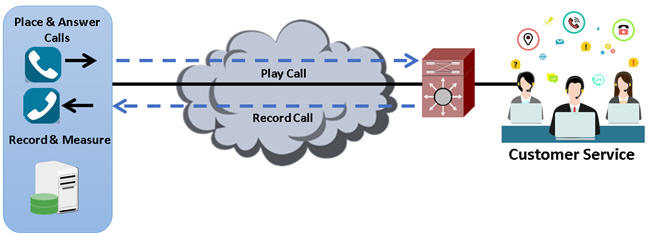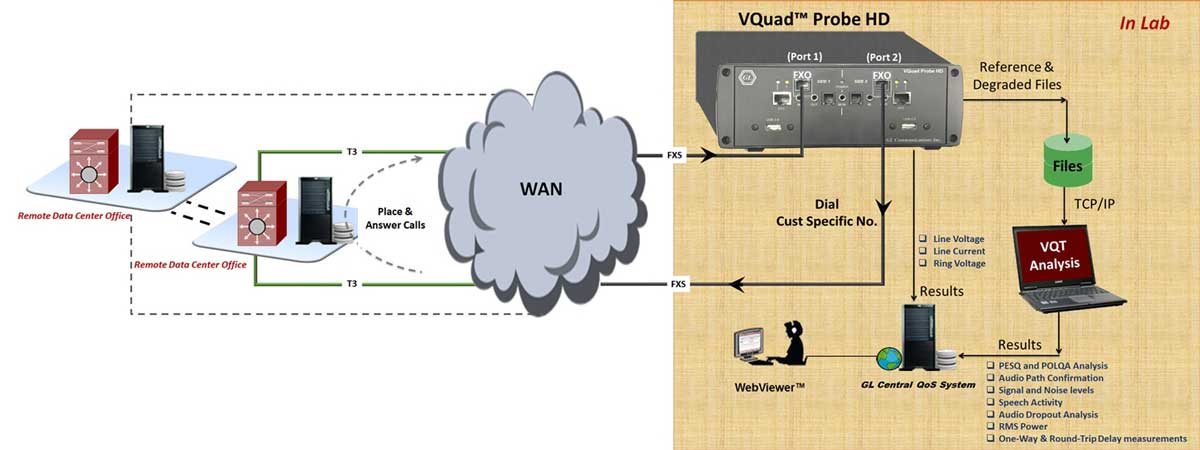Call Quality Testing in the Contact Centers
17th, Aug 2018
Welcome to our August 2018 issue of GL's Newsletter providing information and insight into our new call quality monitoring and audio quality testing in the large contact centers across a wide variety of networks (VoIP, TDM, PSTN, and Wireless).

Contact Center General Setup
Overview
Audio quality along with simple audio path confirmation is extremely important to large contact centers, irrespective of their infrastructure which can be TDM-based, or VoIP based. In fact, most contact centers have a hybrid TDM-VoIP infrastructure are migrating towards all-IP transmission technology. Testing audio at both the contact center (incoming calls) as well as per the customer perspective (calling into the Call Center) is necessary to confirm proper Call Center operation and audio communication. One of the challenges in receiving or transmitting a large volume of requests over integrated TDM and VoIP networks is to ensure call completion and reliable voice quality.
GL's QoS Test Suite provides different test tools to perform call quality monitoring and audio quality testing across a wide variety of networks (VoIP, TDM, PSTN, and Wireless).
GL’s VQuad™ Probe HD is one such test equipment that supports intrusive testing to perform call quality assessment. The entire procedure of placing and receiving calls between end points is automated, quality is measured and reported centrally for verification. Call failures and call drops during the call connection phase are also reported. In fact, the GL test suite is simulating conversations between the customer and the contact center, verifying the call as well as audio quality, in a fully automated method (including support for remote operations).
Besides the intrusive test method, GL also offers other test tools such as Call Capture and Analysis for non-intrusive methods of signaling and audio quality assessment across a wide variety of networks (VoIP, TDM, PSTN, and Wireless).
Use Case

Call Quality Test in Call Centers
As depicted in the test setup diagram above, GL’s VQuad™ Probe HD, along with VQT test suite, was recently deployed for a large contact center with multiple data centers at remote locations supported by T3 network infrastructure.
The FXO ports on GL's VQuad™ Probe HD were connected to two analog lines, commissioned by the contact center for testing purposes, FXO Port 1 used for placing calls while FXO Port 2 used for receiving the redirected call from the contact center. In other words, once the call is generated from VQuad™, the contact center redirects the call back to the VQuad™ where the VQuad™ answers and initiates the voice quality testing. This process continues for a multitude of calls cycling through all DS0s of the T3 T1 line located at the call center (or multiple call centers).
During each established call the VQuad™ sends voice from one end, records voice at the other end, and analyzes the recorded voice using the VQT POLQA algorithm (ITU-P.863).
Tests are fully automated using the VQuad™ scripting and include Call Control analysis along with audio analysis for both Male and Female audio files. Each call runs through the VQT POLQA algorithm along with several additional audio quality metrics yielding Signal and Noise levels, Speech Activity, Audio Dropout Analysis, RMS Power and One-Way and Round-Trip Delay measurements. In addition, the FXO ports can also provide Line Voltage, Line Current, and Ring Voltage. The VQuad™ scripting is extremely flexible for all scenarios.
All results/events/errors are available on the WebViewer™ (Central Database) with outputs going to PDF, Excel or CSV format. The results can be filtered and queried with Custom Reports generated (user-specified results/events). The Custom Reports can also be generated automatically using the WebViewer™ Scheduler with automated emails (or SMS) generated.
Advantages
- Scalable solution for unlimited number of FXO ports
- Supported connectivity includes 2-Wire FXO, 4-Wire Balanced I/O, HSET Interfaces
- Automated QoS Testing of Analog Network
- Manual or Automatic operation of traffic generation and call control
- Wide Band (WB) and Narrow Band (NB) support (for HD and SD Audio)
- Multiple Users and Tests per system
- Run tests between systems
- Fully automated and remote accessible via CLI/API
- Remote accessible via Central Database
- Full FXO Functionality and Analysis via flexible Scripts
- Feature testing including Caller ID, 3-way call (conference call), call transfer, call forwarding, call waiting with Call ID, VMWI, Stutter Dial Tone detection
- Speech to Text Analysis (confirmation of IVR prompts)
- Send/Detect DTMF and user-specified single/dual-frequency tones
- Both Tone and Pulse dialing supported
- Fax testing supporting up to V34
- Customized consolidated results along with the graphical report using WebViewer (web-based application)
- Google Maps using GPS co-ordinates
Applications
Automated QoS Testing
- Solution for testing analog 2-wire Analog interfaces (PSTN, ATA, Media Gateway) and 4-wire Analog interfaces (Balanced headset, PTT, Mobile Phones)
- Both Wide Band (WB) and Narrow Band (NB) support (for HD and SD Audio)
- Automatic call control over several networks with support for transmit/capture of voice files in real-time from various nodes
- Complete automation with enhanced scripting and remote operation including traffic generation, call control, and automated scheduling of operations
Remote Access to Events/Results
- Real-time status of the entire network as well as remote accessibility of any node associated with the test network
- Status of individual ongoing tests including Call Control and Audio capture
- Remote monitoring with result query and real-time statistics
- Custom Reports for both aggregate and individual timestamp-based results (also supports line and bar graph representation)
- Results, events, node status, and devices can be plotted using Google Maps
- Customized Report Scheduling with outputs to file (PDF, Excel, CCV) and sent via email or SMS
Voice Quality Analysis
- Analyze audio using VQT POLQA (ITU-P.863), includes MOS, Signal/Noise Level, Jitter
- Additional audio metrics include Speech Activity, Audio Dropout Analysis, RMS Power, Path Confirmation, Frequency analysis (confirmation of NB or WB)
- Both One-Way and Round-Trip Delay measurements
- Echo Measurement
- Measuring the effect of Packet Jitter in VoIP Network (requires GL PacketScan™)
 Back to Newsletter Index Page
Back to Newsletter Index Page